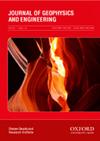振动扫描中线性和非线性低频扫描的特性分析和数据比较
IF 1.7
3区 地球科学
Q3 GEOCHEMISTRY & GEOPHYSICS
引用次数: 0
摘要
低频地震数据在地震数据处理和地震波反演中起着至关重要的作用。目前,实现振子低频激励的方法有两种:一种是利用线性扫描信号激励低频振子,另一种是利用非线性低频扫描信号激励常规振子。使用低频振子进行勘探的成本较高,而且使用传统振子获取足够的低频信息具有挑战性。为此,本文对比研究了低频振动器和传统振动器的低频扫描信号特性和数据效果。因此,本文设计了三种线性和非线性低频扫描信号。理论分析表明,线性和非线性在设计方法、信号形状等方面存在一定差异,但经过相关计算,反映地震响应的信号频谱和相关小波形状基本一致。此外,从实际的力信号数据来看,线性和非线性谐波畸变基本相当。最后,根据对三种扫频信号的正演模拟和现场试验数据的对比分析,可以认为在频谱和小波的基本条件下,振动台的线性和非线性低频扫频信号具有基本相同的去噪能力。二者都能实现低频激励,获得丰富的低频信息,地震资料质量基本相同,可以在实际生产中应用。本文章由计算机程序翻译,如有差异,请以英文原文为准。
Characteristic analysis and data comparative of linear and nonlinear low frequency sweep in vibroseis
Low-frequency seismic data plays a crucial role in seismic data processing and seismic wave inversion. At present, there are two methods to realize the low-frequency excitation of vibrators: one is that the low-frequency vibrators are excited by linear sweep signals, and the other is that the conventional vibrators are excited by nonlinear low-frequency sweep signals. The cost of exploration using low-frequency vibroseis is high, and it is challenging to obtain sufficient low-frequency information using traditional vibrators. To this end, this paper comparatively studies the low-frequency sweep signal characteristics and data effects of low-frequency vibrator and traditional vibrator. Therefore, three kinds of linear and nonlinear low-frequency sweep signals are designed. Theoretical analysis shows that there are certain differences between linear and nonlinear in design methods, signal shapes, etc., but after correlation calculation, the signal spectrums reflecting the seismic response and the related wavelet shapes are basically consistent. Besides, the actual force signal data shows that the linear and nonlinear harmonic distortion are basically equivalent. Finally, based on the forward simulation of three sweep signals and the comparative analysis of field test data, it can be considered that the linear and nonlinear low-frequency sweep signals of vibrator have almost the same denoising ability under the basic conditions of spectrum and wavelet. Both can achieve low-frequency excitation and obtain rich low-frequency information, and the quality of seismic data is basically the same, so they can be applied in practical production.
求助全文
通过发布文献求助,成功后即可免费获取论文全文。
去求助
来源期刊

Journal of Geophysics and Engineering
工程技术-地球化学与地球物理
CiteScore
2.50
自引率
21.40%
发文量
87
审稿时长
4 months
期刊介绍:
Journal of Geophysics and Engineering aims to promote research and developments in geophysics and related areas of engineering. It has a predominantly applied science and engineering focus, but solicits and accepts high-quality contributions in all earth-physics disciplines, including geodynamics, natural and controlled-source seismology, oil, gas and mineral exploration, petrophysics and reservoir geophysics. The journal covers those aspects of engineering that are closely related to geophysics, or on the targets and problems that geophysics addresses. Typically, this is engineering focused on the subsurface, particularly petroleum engineering, rock mechanics, geophysical software engineering, drilling technology, remote sensing, instrumentation and sensor design.
 求助内容:
求助内容: 应助结果提醒方式:
应助结果提醒方式:


